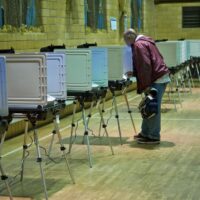FRANKFORT — The Kentucky Senate approved legislation Thursday that its sponsor says protects children from inappropriate materials but which critics say will lead to book banning.
Senate Bill 5, sponsored by Sen. Jason Howell, R-Murray, would create a complaint process for local school districts to filter materials that parents and guardians consider inappropriate for children. It passed 29-4 and now goes to the House for consideration.

Howell said in his closing floor speech on the bill that he sees the bill as middle ground between his colleagues who believe it goes too far and those who think it doesn’t go far enough.
“The great thing about this bill is it keeps us from deciding this up here as legislation,” he said, referring to the power of school boards to review complaints from parents.
The bill defines “harmful to minors” as:
“(a) Contains the exposure, in an obscene manner, of the unclothed or apparently unclothed human male or female genitals, pubic area, or buttocks or the female breast, or visual depictions of sexual acts or simulations of sexual acts, or explicit written descriptions of sexual acts;(b) Taken as a whole, appeals to the prurient interest in sex; or(c) Is patently offensive to prevailing standards regarding what is suitable material for minors.”
Some senators called it a book banning mechanism while proponents said it brings issues of inappropriate material to light. The bill was heard in the Senate Education committee earlier Thursday with people on both sides of the issue testifying.
Sen. Karen Berg, D-Louisville, said she reviewed books from a list that Sen. Lindsey Tichenor, R-Smithfield, had identified from school districts statewide as inappropriate for children. Of the books Berg mentioned, she said one book portrayed a girl being raped by her father and how she felt about it. She didn’t name the title.
“Now I can understand that perhaps the senator from Oldham (Tichenor) doesn’t think her child needs to see that book, but I could promise you there is another child in this state that has been cruelly raped by her father and that book may be a lifeline,” Berg said. State Sen. Jason Howell
In her floor speech, Tichenor called Howell’s legislation “a great start.” A parent of a child in her district approached her with concerns about a book in a school, and Tichenor said she then discovered inappropriate books in schools was a statewide issue.
“Some of those books include pedophilia, and I would ask where do we draw the line? There is a movement in our society to accept all forms of sexuality and we are trying to normalize pedophilia to victims,” Tichenor said.
Tichenor named only one book as an example of offensive material, “Gender Queer: A Memoir.” The graphic novel by author Maia Kobabe, who is nonbinary, has been a frequent target of Republican-controlled legislatures as they’ve pushed “parental rights bills” the past two years. The illustrated novel deals with gender identity and sexuality.
During the committee hearing, critics lodged strong criticism toward the legislation. Kate Miller, advocacy director for the ACLU of Kentucky, compared the bill to “state-sponsored censorship.”
“The debates over whether to allow certain books in schools or student’s access to certain books within school is really losing sight of the overarching function of schools — to train young people to think for themselves,” Miller said.
Miller said some books have been inadvertently banned by related legislation elsewhere, such as the Bible being banned in the past.
Sen. Stephen Meredith, R-Letichfield, responded to Miller with heated words, saying that the bill isn’t “banning books wholesale.”
“It puts a process in place, a due process in place so parents can ask for this to be judged and someone makes a final determination,” Meredith said. “Where’s the line here? Who determines the line?”
“We don’t think the state should,” Miller told him.
“Should parents? That’s a great idea,” Meredith said. “I don’t think this bill is unreasonable by any means.”
Miller said it shouldn’t be the responsibility of the school to remove and restrict specific books from children when conversations could be had among families regarding specific books or material.
This article is republished under a Creative Commons license from Kentucky Lantern, which is part of States Newsroom, a network of news bureaus supported by grants and a coalition of donors as a 501c(3) public charity. Kentucky Lantern maintains editorial independence. Contact Editor Jamie Lucke for questions: info@kentuckylantern.com. Follow Kentucky Lantern on Facebook and Twitter.
McKenna Horsley covers state politics for the Kentucky Lantern. She previously worked for newspapers in Huntington, West Virginia, and Frankfort, Kentucky. She is from northeastern Kentucky.






